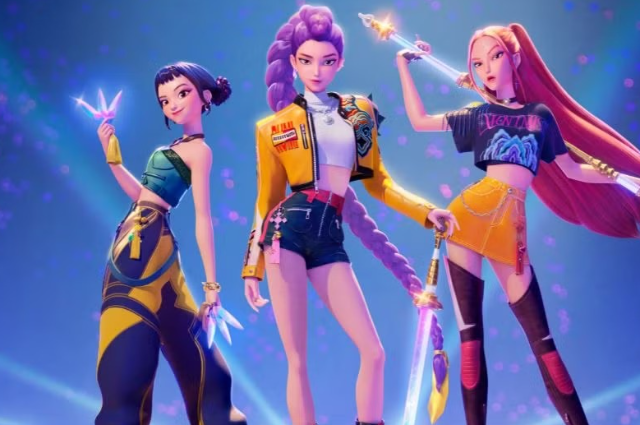
The animated movie K-Pop Demon Hunters, which premiered on Netflix on 20th June 2025, put a unique twist on the K-Pop industry, fashioning the idols as heroes who fight against demons and subtly critiqued some of the practices that have been ingrained within it. The movie was a huge success, due to its interesting protagonists, catchy songs, and a very persistent fandom that has conquered the internet with fan art, fanfiction, and more.
Since the movie partially focused on the idol, it brought to mind another movie. One from 1997, directed by the late Satoshi Kon. Adapted from the Japanese novel of the same name, Perfect Blue gave a surrealist view of the Japanese idol industry and how it disrupted the notions of identity, reality, and the everyday fan. Every part of the movie is still relevant, and every shot lingers in the consciousness. As a result, Perfect Blue shows the darkness behind the scenes.
An idol can loosely be defined as a person worth admiring. Another definition, in religion, is a symbol of a deity, mostly used in Pagan religions. However, the term idol has a different meaning in East and Southeast Asian cultures. It refers to a person who is meant to entertain in all aspects, a jack of all trades. In Japan, the idol culture started with the success of Sylvie Vartan in her film Cherchez l'idole, which became a sensation in the island nation. The formula was co-opted, and thus started the ephemeral tradition of idol culture in Japan, a short-lived dream for girls and boys as long as they appeased the public and held true to the falsified image propagated by the production houses and companies. They were supposed to be pure and virginal, innocent of all the flaws that made them human. Since the 1970s, Japan has pumped out idols like products from factories, all perfect and glossy and meant to be beyond human.
The idol industry has since spread out of Japan and into other countries within East and Southeast Asia. South Korea now has the most popular idol industry with acts like Blackpink and Twice, who have gained international notoriety. Other countries that have produced their idols are China, Taiwan, and Thailand, though the standards of the act vary from country to country and from generation to generation.
True to the definition, idols seemed to transcend the pitiful notion of humanity. To the fans, they were symbols to be worshipped and admired. To the delusional ones, they were possessions to be hoarded and kept. And to the companies, they were cash cows, the golden goose who would save failing companies from bankruptcy and turn rich ones richer. It is all business, and in the process, the idols are the ones taking the fall for human greed.
Within the movie, the protagonist Mima practices for almost everything. She is a good actor, a good singer, dancer, and entertainer. This is just a façade for her fans. There is nothing authentic about it, and the movie supports this by constantly pitting the image of Mima the clean-cut idol against the real Mima, making the audience question the state of reality and the identity of the protagonist. In the song ‘Angel of Love,’ the scene switches from the way CHAM! is viewed by the fans and the struggle of performance from the side of the idols.
In order to keep with the ideals of purity and innocence, the initial appearance of CHAM! is extremely childlike, showing the young women wearing pink dresses with frills and bows and singing about innocent love. Everything about this is meant to contrast with their actual age and personalities, and the surrealistic camera angles portray this dissonance better than ever. In the latter half, this purity is symbolically shattered by the rape scene that Mima acted in once she switched her career. Mima’s past is ripped off violently, just like the quick decision the company decided to make in order to promote her as an actress instead of an idol, which became yet another decision from which the company earned money through her.
Here, the changing nature of the idol is shown. It is fickle and broken just from the change of image. The fans are loyal, not to the person, but to the airbrushed version put forward to them by corporations. The character named ‘The Man’ has all of the merchandise of Mima and CHAM! But even he does not know her as a person. Everything is simply an illusion, and the idols are the ones sacrificing their health and identity to put forth this illusion to the public. Nothing showcases this better than the scene where Mima finds a website on the internet that seems to mirror her apartment room. It is precise and accurate, but lacks the human quality. It is merely the image, the same image sold to the fans. Mima the person is disconnected from Mima the idol, something that both the fans and the woman herself struggle to accept. The ending addresses this, forcing the viewers to question if the woman at the end is still the same as the one throughout the movie, a changed version, or a different person altogether.
Perfect Blue questions the idol industry and its system of pumping out false idols and its contribution to creating slavish fans, adding to the loneliness that is only growing in Japanese society. The idol is merely a corporate creation, and like everything in late-stage capitalism, a farce to enter the pockets of the ignorant consumers.
